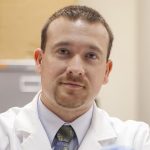
2015 V Foundation Wine Celebration Volunteer Grant in honor of
Will and Diane Hansen in memory of their daughter
Elizabeth Ann “Betsy” Hansen
Second year funded by UNICO, in honor of Steve Pisano
Colon cancer is the second leading cause of cancer related death in the United States. Despite an increase in colon cancer screening, many patients present with advanced disease, including a high proportion from minority and underserved populations. Improved treatment strategies are urgently needed to combat this disease. To develop new therapies, we are now examining what abnormalities or mutations are present in the DNA of the cancer cells. The mutations present in these cells are largely responsible for how the cancers act, including their response to certain drugs. We are now grouping colon cancers based on the profile of mutations that are present and developing combinations of drugs targeting each specific subtype.
In this proposal, we determine the ability of innovative treatments to target subtypes of colon cancer by taking advantage of the cell’s weaknesses based on the mutations they have acquired. Our laboratory has developed new cancer cell and mouse models engineered to develop colon cancers with certain mutations uniquely positioning us to accomplish the studies described in this proposal. These studies will bring us closer to the goal of personalizing treatment for patients with subtypes of colon cancer by identifying the patient population most likely to benefit. These investigations will also guide further studies into overcoming cancer cell drug resistance mechanisms with combination strategies and provide insight into the treatment of other cancer types possessing similar mutations.

Human papillomavirus (HPV) is a sexually transmitted viral infection that causes over 5% of all cancers worldwide and in the United States is responsible for 25-30% of all head and neck (i.e. throat, tonsil, and tongue) cancers and nearly all cervical cancers. Our lab focuses on how HPV influences how cancers respond to radiation and chemotherapy. In this project, we will study cancer initiating cells. These cells are thought to be responsible for the development of cancer and are often resistant to standard therapies.
Patients with HPV-caused head and neck cancer often present with advanced disease (Stage III or IV). Despite this, HPV associated cancers respond well to radiation with or without chemotherapy. We believe that HPV may help explain this dichotomy (advanced cancer but good prognosis). We will study the role of HPV-positive cancer initiating cells in invasion, metastasis, and the response to therapy. We will provide evidence for how HPV modulates cancer initiating cells and point to ways in which we can personalize therapy for these patients to improve their quality of life, minimize toxicities while maintaining cure rates, and decrease the costs of care for these patients.

V Scholar Plus Award- extended funding for exceptional V Scholars
Our lab is focused on improving treatment for patients with head and neck cancer. This project is studying cells that allow a cancer to spread to other parts of the body (i.e. metastasize). We believe that these same cells, termed cancer initiating cells or CICs, are also resistant to standard treatments. The first two years of V Foundation support has been very helpful. Using cells growing in plastic dishes and mice we have found a key pathway that CICs use to survive anti-cancer treatments. This same pathway also helps these cells to spread to other parts of the body. Our goal for the next year is to study these pathways in human cancers.
We will study whether the genetic information that controls CICs in our models can be used to identify them in human tumors. We want to learn whether tumors with more CICs are more resistant to standard treatments. Finally, we will use tissues from actual patients to study whether patients whose tumors have more CICs are more likely to have aggressive cancers. These experiments will allow us to identify new ways to treat these cancers. We hope to improve our ability to select the right treatment for an individual patient.

Triple negative breast cancer often strikes young African-American and Hispanic women and spreads to the lungs and brain. There are no approved drug treatments for this type of breast cancer other than chemotherapy. Clearly, there is a pressing need to develop better treatments for this disease. We have developed a new approach that uses diet to prime tumor cells to respond better to cancer drugs. The diet we are using is similar to a vegetarian diet. We will test this diet in combination with a new drug that kills tumor cells in mice and in patients with triple-negative breast cancer. We predict that the combination will be better than the drug alone. Our goal is to improve survival for patients with triple negative breast cancer.









